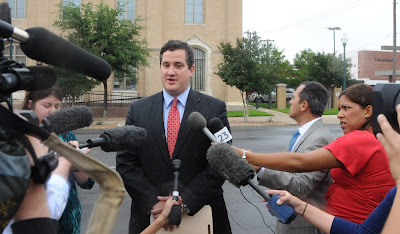 |
| Criminal Defense Attorney Jonathan Sibley |
Waco
– Don't go to jail in Waco. Cross the Brazos somewhere else if you
figure you can afford to get locked up.
It's
like shooting craps with a set of bones that have no spots, or at
least, spots visible only to the house, and none of the other players.
The
cops and courts won't even tell your lawyer what evidence and
testimony they are prepared to use to prove the case they have on
you.
Withholding
information costs taxpayers big money. It doubled the cost of housing
overflow prisoners from about $3 million a year to $6 million. That
will become a big issue in the 2014 Republican Primary race for
District Attorney.
In
this get tough on crime town, a lawyer isn't allowed to see the list
of witnesses or know the specifics of a criminal complaint until
after an indictment is returned – if then.
Cases
drag out for years.
Some
criminal defendants and their attorneys balk not only at plea bargain
offers for stiff sentences, but are very reluctant to announce they
are ready for trial because a motion for discovery isn't part of the
routine of doing business in these parts.
An
“Agreed Discovery Order” is the only game in town.
The
defense bar hit the issue hard in February, blaming jail overcrowding
and skyrocketing costs on the practices of the Criminal District
Attorney.
The
Sixth Amendment guarantee for compulsory discovery of witnesses and
evidence pales under the conditions practiced in McLennan County's
criminal district courts.
Item
5 in the standard discovery order agreement offered defendants in the
Waco courts stipulates “Copies of police reports concerning the
offense alleged in the indictment will be provided to the defendant’s
attorney for review. When a copy of the police report is provided
to the defense attorney it is to remain in the possession of the
defense attorney and is not to be turned over to the defendant or
copied and given to the defendant. The police report is intended to
remain the property of the McLennan County District Attorney’s
Office and is provided to the defense counsel for the convenience of
defense counsel only.”
One may read the standard Agreed Discovery Order form used in both district courts by clicking here.
(click)
Lawyers
get only once chance to review the prosecutors' file – by
appointment, at the DA's office – and that chance may not come
within 20 days of the first status conference scheduled in the case,
as required by the Texas Code of Criminal Procedure. The agreement
calls for a deadline of not less than 20 days before the trial. After
all, it's an agreement reached by the Court, the Prosecution, the
Defense Attorney, and the Defendant.
Funny
thing, most defendants don't recall entering into any such agreement.
Did they sign the form? Who knows? What would you sign to get out of
some hell hole jail for free?
It's
hard to remember exactly who to call as a witness in your behalf
after sitting in jail for 90 days without prosecution, gaining
release on a personal recognizance bond, and waiting more than a year
as pre-trial hearing after pre-trial hearing comes and goes and the
attorney still hasn't gotten a chance to see the evidence that would
be used at trial.
Among
attorneys, court coordinators, bondsmen, clerks, law men, jail house
snitches and cross bar lawyers, it's agreed. Things have changed
since Republican Abel Reyna took over following the landslide year of
2010 when he defeated 20-plus year DA John Segrest.
Compared
to a “Defendant's Motion for Discovery and Inspection of Evidence,”
the agreed discover order is a pale imitation of what is standard
operating procedure in courts throughout the Lone Star State.
The
issue reached tipping point when a small committee of lawyers
confronted District Attorney Abel Reyna in Commissioners' Court,
accusing him of practices that cause jail overcrowding, make tax
rates rise, and budgets bulge.
 |
| Criminal District Attorney Abel Reyna |
According
to Jonathan Sibley, “This isn’t
pointing fingers at anybody or saying anything negative about the
process, but at some point in time what everybody has told me is that
over the last couple of years they’ve seen — across the board,
essentially — plea bargains go up. More people (are) being offered
jail time and a longer sentence, which makes the case harder for our
clients to accept.”
Robert
Callahan told the Court that a minimum of 15 years is the only offer
on the table for an accusation of a first degree felony, “regardless
of the circumstances.” A conviction calls for not less than 5 years
and no more than 99 years.
“The
pipe is getting clogged somewhere in between the clients and the
defense attorneys and the judge, which means something’s happening
with the district attorney’s office,” Callahan said. “Most
clients, in my opinion, are willing to plead.”
Mr.
Reyna denied there is any truth to Mr. Callahan's allegations. “A
lot of them are patently false,” Reyna said. “Either he doesn’t
understand the system (or) he doesn’t understand the process, but
it’s just false.”
He
noted that he inherited a 1,200-case backlog when he took office on
January 1, 2011.
Waco
attorney Dick Kettler pointed out the obvious. He said the Court
should reopen its downtown jail.
Housing
overflow inmates in the for-profit Jack Harwell Detention Center
inflated from a budgeted $2.6 million item to $5.6 million, and it
caused Commissioner Kelly Snell to invite the defense lawyers to
present their grievances to the Court.
Commissioner
Lester Gibson is on record suggesting the use of more than 300 idle
bunks in the disused downtown jail. ““I think the D.A. is doing
what he was elected to do. We need to do what we were elected to do,
because we have a problem with the jail that’s going to make us or
break us.”



No comments:
Post a Comment